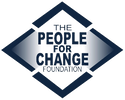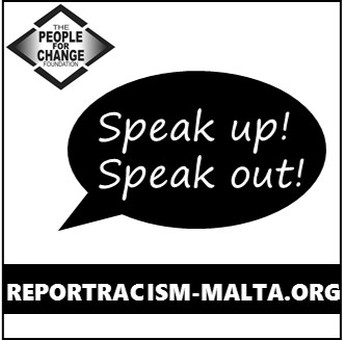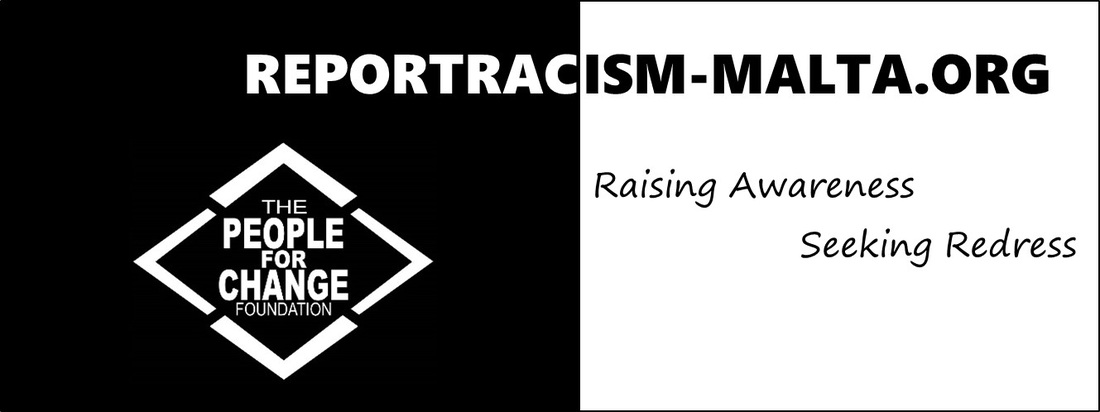Report Racism Malta - www.reportracism-malta.org
|
Project start date: 16/11/2014
Duration: Ongoing Report Racism Malta is a project of the People for Change Foundation, launched in November 2014 to address the under-reporting of discriminatory incidents by creating an easy-to-use mechanism for communicating incidents of racial discrimination. Report Racism Malta will provide an avenue for reporting incidents to individual victims of discrimination and racism, and will offer guidance in cases where cases may be taken forward and remedies accessed. |
Reports and Publications
The project publications will be made available here following their launch in 2015.
Aims and Objectives
The aim of this project is to combat racism and related discrimination in Malta by supporting victims of such incidents in communicating their experience and collect enough data to fill in the gaps in this area of research and understand what the situation in Malta is like. Through this initiative, PfC aims to work with people who have faced discrimination in order to raise awareness of the pervasiveness of racism in Malta and to provide an accessible option for individuals wishing to report racist incidents in Malta.
- To tackle the problem of underreporting,
- To provide a system for individuals who have been victims of racism to be able to report such incidents,
- To develop a clearer picture of the state of racism and racist violence in Malta, helping to simultaneously build an understanding of and narrow the information gap in the area; and informing policy developments in the field,
- To produce a research report that engages with reported cases of instances of racism in Malta and develop evidence based policy recommendations for improving equality measures in Malta,
- To explore the viability of a European system of reporting racist incidents.
Background
A reporting system for racist incidents is internationally recognised as a crucial stage in challenging racism because it gives a voice and directed action to those suffering racial harassment or discrimination. The data collected in a reporting system allows the authorities to act upon individual incidents and establish policies to tackle wider trends. It also increases social cohesion and public awareness, which provides community support for those experiencing racism.
Research by European Union Agency for Fundamental Rights (FRA) has consistently found that members of ethnic and religious groups, national minorities and migrants are faced with prejudice on an everyday basis. Shortfalls in national data collection methods also mean that a lot of these crimes remain unrecorded, leaving them unresolved and invisible. Through its EU-MIDIS report FRA found that between 57-74% of incidents of assault or threat suffered by members of minority or migrant groups in the EU were not reported to the police. The same report highlighted that 63% of Africans in Malta experience high levels of discrimination (amongst the highest levels in the EU, second only to Roma in the Czech Republic), and that 29% of African migrants in Malta fell victim to what they considered to be racially motivated crime. There is also a lack of awareness with regards to knowledge of any law against the discrimination of migrants and ethnic minorities, as well as appropriate organisations or equality bodies that are mandated to support victims of discrimination.
A report by the National Commission for the Promotion of Equality (NCPE) has claimed that 85% of interviewees belonging to a “minority ethnic group” did not report instances of racial or ethnic discrimination to the authorities because they believed that the situation would remain unchanged. A study carried out by the NCPE on racial discrimination in Malta also shows that 70% of the interviewees belonging to a minority ethnic group had no knowledge of the NCPE’s existence and role. While only 11% of African respondents to the EU-MIDIS survey in Malta were aware of the NCPE. This in itself resulting in significant underreporting of racial discrimination.
The reluctance of victims to report instances of hate crime to the Maltese police is a matter of concern as it undermines the possibility of an investigation. The reasons for lack of reporting stem from a general feeling of disempowerment among migrants, resulting from perceived lack of action taken on behalf of the few instances that do get reported. This has caused a great deal of anxiety and uneasiness in the sense that persons felt that they were not being duly protected, further fueling the distrust of the migrant community of the police.
The year 2013 also saw a notable increase in the level of hate speech in Malta, particularly over the internet and in other public fora. The ENAR Shadow Report 2012-13, written by The People for Change Foundation, highlighted the need for data collection on racially motivated crime. The report stated that this leaves a significant gap that must be addressed, with more detailed and segregated data collection urgently needed in confronting matters relating to discrimination on the grounds of race and ethnicity.
Research by European Union Agency for Fundamental Rights (FRA) has consistently found that members of ethnic and religious groups, national minorities and migrants are faced with prejudice on an everyday basis. Shortfalls in national data collection methods also mean that a lot of these crimes remain unrecorded, leaving them unresolved and invisible. Through its EU-MIDIS report FRA found that between 57-74% of incidents of assault or threat suffered by members of minority or migrant groups in the EU were not reported to the police. The same report highlighted that 63% of Africans in Malta experience high levels of discrimination (amongst the highest levels in the EU, second only to Roma in the Czech Republic), and that 29% of African migrants in Malta fell victim to what they considered to be racially motivated crime. There is also a lack of awareness with regards to knowledge of any law against the discrimination of migrants and ethnic minorities, as well as appropriate organisations or equality bodies that are mandated to support victims of discrimination.
A report by the National Commission for the Promotion of Equality (NCPE) has claimed that 85% of interviewees belonging to a “minority ethnic group” did not report instances of racial or ethnic discrimination to the authorities because they believed that the situation would remain unchanged. A study carried out by the NCPE on racial discrimination in Malta also shows that 70% of the interviewees belonging to a minority ethnic group had no knowledge of the NCPE’s existence and role. While only 11% of African respondents to the EU-MIDIS survey in Malta were aware of the NCPE. This in itself resulting in significant underreporting of racial discrimination.
The reluctance of victims to report instances of hate crime to the Maltese police is a matter of concern as it undermines the possibility of an investigation. The reasons for lack of reporting stem from a general feeling of disempowerment among migrants, resulting from perceived lack of action taken on behalf of the few instances that do get reported. This has caused a great deal of anxiety and uneasiness in the sense that persons felt that they were not being duly protected, further fueling the distrust of the migrant community of the police.
The year 2013 also saw a notable increase in the level of hate speech in Malta, particularly over the internet and in other public fora. The ENAR Shadow Report 2012-13, written by The People for Change Foundation, highlighted the need for data collection on racially motivated crime. The report stated that this leaves a significant gap that must be addressed, with more detailed and segregated data collection urgently needed in confronting matters relating to discrimination on the grounds of race and ethnicity.



